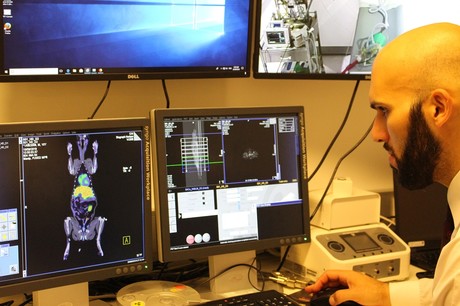Nanomedicine to treat prostate cancer in man's best friend

A 10-year-old beagle with prostate cancer is helping researchers at The University of Queensland (UQ) use nanomedicines to accurately diagnose and target the disease.
Nanomedicine is the science of developing tiny particles for applications in health — in this case, therapeutics to specifically target a protein found in prostate cancer. According to Associate Professor Kris Thurecht, the new technology is important for advancing cancer treatments.
“Chemotherapy is a common treatment for most cancers,” he said. “Unfortunately, it can also cause serious side effects because it is not always able to differentiate cancer cells from the healthy ones, sometimes damaging healthy cells in the process.
“Nanomedicines with the ability to target specific areas can lead us to target chemotherapy drugs to where they’re needed, and kill cancerous cells with minimal impact on healthy cells.”
Hoover the beagle will now become the first patient in the world to receive the newly developed nanomedicine, which the research team hopes will help track and treat his cancer and lead to better treatment for people with the same disease. He was chosen for the trial because dogs — like humans — naturally develop prostate cancer.

Dr Thurecht said preclinical studies have been successful in treating prostate cancer in the laboratory, leading to total remission in some cases. “Validation of this science and technology in companion animals like Hoover is an exciting step forward in nanomedicine and towards human treatment,” he said.
Dr Rod Straw, Veterinary Oncology Specialist and Director of the Brisbane Veterinary Specialist Centre and Australian Animal Cancer Foundation, said the beagle could prove to be the vanguard for a revolution in health care.
“Cases like Hoover’s are very important to cancer research,” he said. “We can learn to develop cancer treatments for not only pets but humans as well.
“Our best friends may hold the key.”
Retinal health linked to dementia risk, study shows
Researchers have discovered that the blood vessels at the back of the eye — called retinal...
Pancreatic cancer hijacks metabolism switch to help it spread
Pancreatic cancer hijacks a molecule known for regulating physiological processes, such as food...
Novel antibiotic activates 'suicide' mechanism in superbug
Researchers have discovered a new class of antibiotic that selectively targets Neisseria...




